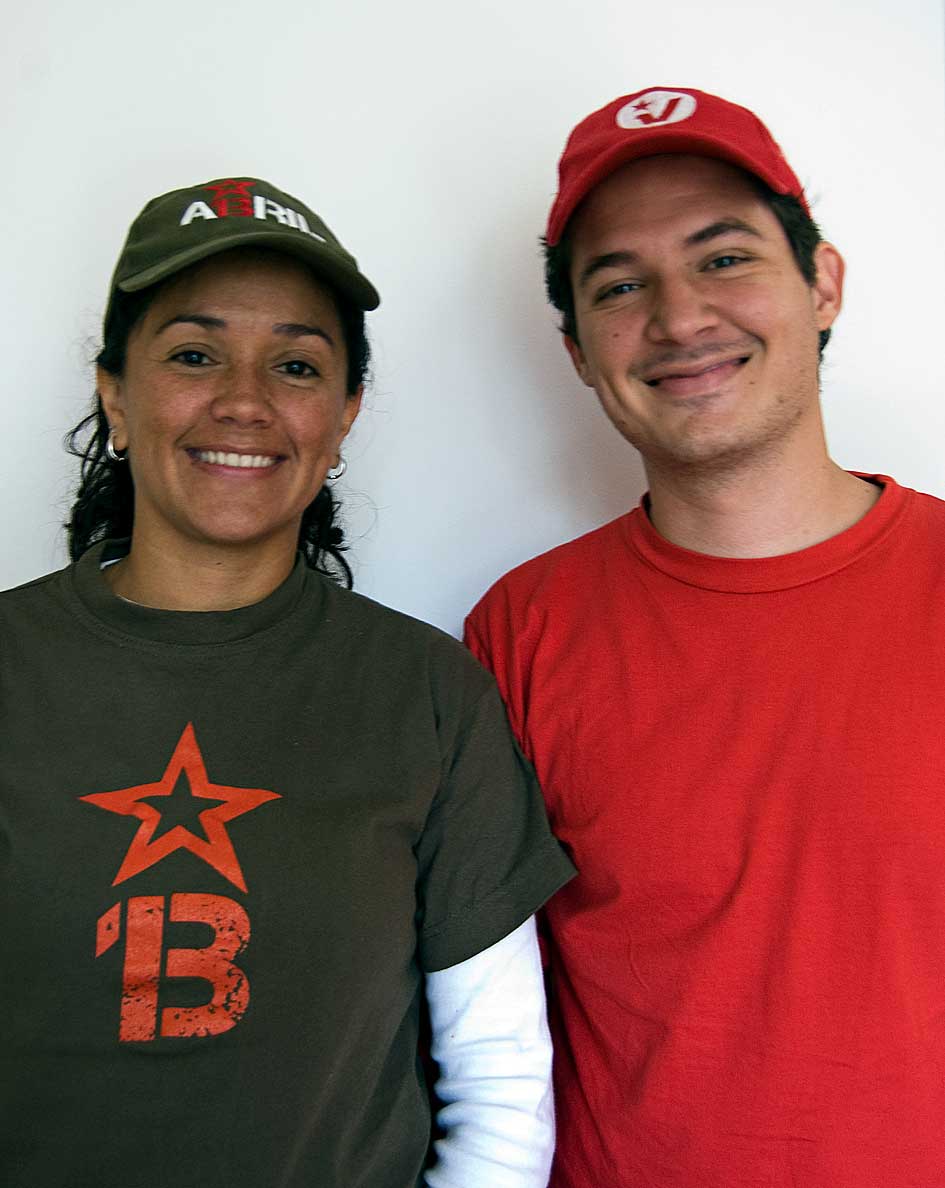Pointing the way forward
Morning Star - Venezuelan Socialist United Party (PSUV) members Katy Jaimes and Elias Chacon are currently touring Britain to build solidarity with the Bolivarian revolution and the movement of occupied factories in Venezuela.
 The PSUV "is the socialist party of the Venezuelan revolution," says Jaimes. "It was founded with the aim of uniting all the different organisations of the Venezuelan left."
The PSUV "is the socialist party of the Venezuelan revolution," says Jaimes. "It was founded with the aim of uniting all the different organisations of the Venezuelan left."
A recent PSUV congress saw delegates commit to the principle that socialism is not just a set of social reforms but a "fundamental transformation of society."
However achieving this transformation is no easy task. Workers have had to adopt a number of tactics in their bid to build a socially just future.
Chacon explains: "Faced with the sabotage of the economy on the part of the employers and in order to defend their jobs and livelihoods, different groups of workers have occupied factories in Venezuela since 2002."
President Hugo Chavez himself gave support to these actions and made an appeal that "factories that the owners close down should be occupied by the workers."
Since 2005 the Bolivarian government has given legal cover to these actions by nationalising some of these enterprises, like paper mill Venepal and valve-making factory CNV (now Inveval) among others.
"The workers did not occupy the factories just for the fun of it but in a basic struggle to defend their families' income," says Jaimes.
As a result they set up workers' councils to manage these companies.
But this struggle has not been without problems. Unfortunately "the leadership of the UNT trade union confederation did not take up this call from President Chavez, being mired in internal power struggles," says Chacon.
This forced the workers in the occupied factories to organise themselves and link up with the nearby communities.
Jaimes explains the case of the Gotcha workers, a group of female textile workers in Aragua.
The owner closed down the factory and abandoned production leaving the women workers without even any compensation, so they were forced to take over the installations.
It was then that the question of starting production themselves was posed.
"They are now producing and selling directly to the communities, which is a massive step forward," says Jaimes. "They have shown that the workers can produce without bosses."
At nearby INAF, also in Aragua, the workers were also forced to occupy the installations once the employer fled.
More than 4,000 industrial establishments have closed down since 1998, showing "the parasitical character of the capitalists in Venezuela," says Chacon.
INAF, which has been functioning under workers' control for the last four years, makes plumbing parts. These experiences have brought out the best in workers' resourcefulness. "Having no capital and no raw materials, INAF workers unearthed a ton of faulty parts which had been buried in the factory yard," says Chacon.
A leading factory in the workers' control movement is Inveval, which makes valves for the oil industry. There the workers have not only shown that it is possible to produce without bosses "but they have even increased the quality standards of the valves they make and repair, almost eliminating leakages completely," says Chacon with pride.
Unfortunately workers in the occupied factories are facing sabotage from sections of the state bureaucracy, which are even blocking initiatives from President Chavez.
Chavez publicly ordered the nationalisation of the INAF factory in October 2009, but this has not yet been implemented, leaving the workers in a legal limbo, which makes their work very difficult. The Gotcha workers are also demanding that the factory be nationalised so that their legal status can be put on a firm basis.
The workers involved in this movement have learned a lot through their struggle. "They do not want to become owners or bosses themselves," explains Jaimes.
"What they want is to have socialist production on collective basis and for the collective well-being.
"These occupied factories are an important achievement of the revolution which show the way forward for the workers' movement in Venezuela as a whole," says Jaimes. "They show it is possible to achieve socialism if we are conscious of what we want and fight for it."
Katy Jaimes and Elias Chacon are speaking at the Hands Off Venezuela conference today (Saturday May 22). Conference runs from 10am to 6pm, University of London Union, Malet Street WC1E 7HY. For more information visitwww.handsoffvenezuela.org
Original source: Morning Star Online

 Please help build the campaign by
Please help build the campaign by 